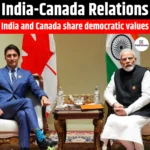|
GS Paper – II: International Relations |
Why in News?
Canadian Prime Minister Justin Trudeau resigned from both his role as Prime Minister and leader of the Liberal Party. Trudeau will continue in office until a successor is selected, with elections looming on the horizon.
Why Did Justin Trudeau Resigns?
Canadian Prime Minister Justin Trudeau faced mounting pressure from his own to step down, a sentiment that grew over several months. As his leadership became more isolated, dissatisfaction within the party intensified. This discontent was compounded by internal conflicts and Trudeau’s handling of the country’s economic challenges, which contributed to the eventual decision to resign.
- The frustration was palpable as 24 Liberal MPs publicly demanded Trudeau’s resignation in October. With no strong successor in sight, the party now faces a leadership vacuum.
- Inflation and the economic impact of the COVID-19 pandemic have led to growing dissatisfaction with Trudeau’s leadership. Only 28% of Canadians wanted him to run for elections again, and his approval rating dropped to 30%.
After Justin Trudeau resigned as Prime Minister, the Liberal Party began searching for a new leader. Mélanie Joly, Christy Clark, and Mark Carney are among the potential candidates for this. The parliamentary session is set to begin on January 27. Now a confidence vote and early elections could happen soon.
About Justin Trudeau
Justin Pierre James Trudeau, born on December 25, 1971, in Ottawa, Canada. He is the second youngest Prime Minister in Canadian history and is known for his charismatic leadership style. He became Prime Minister in 2015 and remains in office till January, 2024.
- Education: Justin Trudeau is son of former Canadian Prime Minister, Pierre Trudeau. Despite growing up in a politically active family, he pursued education and teaching as a career. He attended Jean-de-Brébeuf College in Montreal and later earned a degree in Environmental Geography from McGill University and the University of British Columbia.
- Family Background: Trudeau’s family is highly prominent in Canadian politics. His father served as the Prime Minister of Canada. He had two brothers, Alexander Trudeau and Michel Trudeau. He married Sophie Grégoire in 2005. They have three children: Xavier James Trudeau, Ella-Grace Margaret Trudeau, and Hadrian Grégoire Trudeau.
- Career: Before entering politics, Justin Trudeau worked as a high school teacher in Vancouver, where he taught French, math, and drama. He entered politics in 2008 when he was elected as the Member of Parliament for Papineau, Quebec. In 2013, he became the leader of the Liberal Party and aimed to revive the party’s fortunes.
- In 2015, under his leadership, the Liberal Party won a majority in the House of Commons, and Justin became Canada’s Prime Minister.
Justin Trudeau as Prime Minister of Canada (2015–2024)
- Trudeau was sworn in as Prime Minister of Canada on November 4, 2015 and formed a Liberal majority government.
- He introduced tax cuts for middle-income Canadians and increased taxes on the top 1% earners.
- He reinstated the mandatory long-form census that had been discontinued in 2010.
- He introduced a child benefit program in 2021, claiming it lifted 400,000 children out of poverty.
- Trudeau implemented a carbon pricing policy to reach net-zero emissions by 2050 and reduce greenhouse gas emissions by 30% by 2030.
- He introduced a housing accelerator fund and a ban on foreign buyers to combat rising housing prices.
- In 2019, Trudeau’s Liberal Party won the most seats in the federal election and formed a minority government.
- Same year, he dealt with COVID-19 pandemic by introducing financial aid programs, including CERB (Canada Emergency Response Benefit) and CEWS (Canada Emergency Wage Subsidy).
- He deployed Canadian Armed Forces to long-term care homes in Quebec and Ontario as part of Operation Laser.
- In the 2021 election, his party won 160 seats in the federal election and secured a third mandate and second minority government.
- He signed a confidence and supply agreement with the NDP in 2022, with NDP supporting the Liberal government for the remainder of the 44th Parliament.
- He improved trade relations with the US through the CUSMA agreement. This agreement made concessions on US dairy imports and addressed tariffs on steel and aluminum.
- In 2024 Canada faced food bank usage at its highest level amid a global food crisis.
Honors Awarded to Justin Trudeau
- On February 6, 2012, Trudeau was awarded Queen Elizabeth II Diamond Jubilee Medal as a member of the House of Commons of Canada.
- On May 16, 2018, he received an Honorary Doctor of Laws (LL.D) degree from New York University and gave the commencement speech.
- On June 19, 2019, Trudeau received the Grand Cross of the Order of La Pléiade honorary award.
- On August 23, 2024, President Volodymyr Zelenskyy awarded the Trudeau Order of Liberty (Ukraine) honor for his contribution to strengthening Ukrainian-Canadian relations.
Canada’s Power Shift Impact on India
- Visa Policy Adjustments: If the Conservative Party comes to power in Canada, there could be a relaxation in the current strict visa policies. This may result in easier access for Indian nationals seeking work or study opportunities in Canada.
- Diplomatic Relations Improvement: Under Justin Trudeau’s leadership, Canada’s support for pro-Khalistan elements strained relations with India. A change in leadership could lead to a shift in policy.
- Increase in Indian Immigration: Despite a slight decline in the number of Indians migrating to Canada in recent years, a shift in leadership could encourage an influx of Indian immigrants. Canada’s immigration policies might become more favorable to Indian nationals, boosting the diaspora.
- Economic Cooperation Boost: A change in government could lead to renewed efforts to strengthen economic cooperation between Canada and India. Areas like trade, technology, and investment could see growth as the new leadership looks to expand business ties.
- Geopolitical Alignment: Canada’s foreign policy under a new government may align more closely with India’s interests in international forums. This could result in a more supportive stance on global issues such as climate change, security, and economic reforms.
|
UPSC PYQ (Previous Year Question) Question: In Which one of the following groups are all the four countries members of G20? (2020) (a) Argentina, Mexico, South Africa and Turkey (b) Australia, Canada, Malaysia and New Zealand (c) Brazil, Iran, Saudi Arabia and Vietnam (d) Indonesia, Japan, Singapore and South Korea Anser: (a) |
Explore our Books: https://apnipathshala.com/product-category/books/
Explore Our test Series: https://tests.apnipathshala.com/










